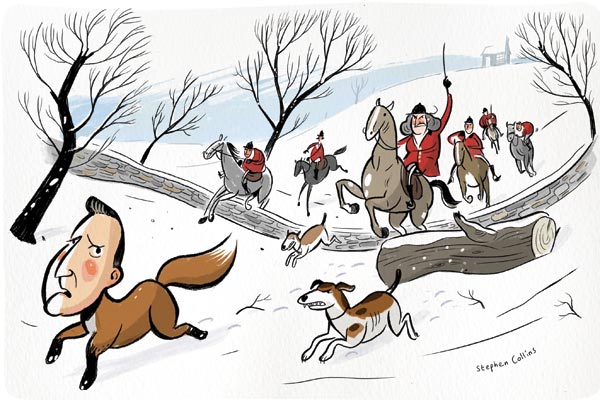Class war. It’s not very classy, is it? But it’s Labour’s big thing at the moment, the class-of-politicians-crisis, which it thinks works well with the other crisis facing hardworking families up and down the country that the party likes to talk about, and allows Ed Miliband to duck awkward things like responding to the Budget. He and his henchmen have spent the past week and a half talking as much about Etonians as they have pensioners. On Tuesday, Rachel Reeves had her go, banging on about rich Tories buying Lamborghinis. Ed Balls was the follow-up act on Wednesday (having already had a first shot last week with his jokes about the PM’s friend ‘Bingo’). He told the Commons that:
‘When the hon. Member for Skipton and Ripon (Julian Smith) and the Chancellor say that is a tax rise for business, that is only true if they do not think small businesses are proper businesses, which is a bit like saying, “If you didn’t go to Eton, you didn’t go to a proper public school.”’
Tory backbencher Mark Pritchard intervened on both Reeves and Balls this week to remind them that not all Tories are from wealthy backgrounds. Reeves rather chippily told him she was sorry he couldn’t afford a Lamborghini from his savings, while Balls joked that ‘I went to an even lesser private school than the Chancellor!’
That last remark highlights the problem with this class war (apart from it being a really rubbish way of avoiding talking about, you know, policies). None of the parties have got a leg to stand on when it comes to class. Both the Labour and Conservative frontbenches are well-stocked with private school alumni (even though the Labour party is only 12% privately educated, 20% of the Shadow Cabinet went to private school. And 54% of Tory MPs went to private schools, with 38% of Tory Cabinet ministers). Just 7% of children in school are currently in the private sector.
And as Seb explained recently, what bothers voters more than the ‘preposterous’ number of Etonians in politics is politicians who have never had a ‘real’ job.
But the class war does make the Tories jumpy, particularly those who aren’t entirely comfortable in their own skins. David Cameron has never quite appeared at ease about his own accident of birth, whereas Boris Johnson embraces his poshness and moves on. He’s sincere, which is what voters care more about. The party knows it’s a sufficiently weak spot and a sufficiently rich seam for Labourites to mine that it makes MPs anxious about certain policy announcements: I quote one marginal MP in my Telegraph column today who supports repealing the Hunting Act but doesn’t want a debate about it because Labour could tie Etonians and hunting together to make a nice mess for the Conservatives. And of course certain Tories only egg Labour on with deeply unhelpful comments.
That aversion to confronting the hunting problem may well be because the pro-hunting side would lose, but it creates another problem, which is that pro-hunt campaigners who poured resources into Tory constituencies in 2010 are furious that some of the MPs they supported have turned tail and fled the cause since entering parliament. Melissa Kite wrote about this fury for the Spectator in December. I hear that at one bash, Lord Feldman described Vote-OK as the ‘private army’ of the Conservative movement. Afterwards, a senior Vote-OK rep made clear that they were in fact ‘mercenaries who still haven’t been paid’. Which points to another war, waged within the Tory party, alongside the class battle that Labour fancies fighting.







Comments